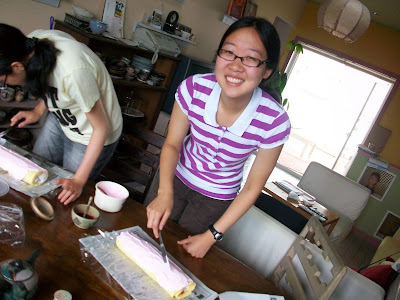Sapporo's famous Miso Ramen. Delicious, although Hakodate's Shio Ramen is definitely the best.
Every so often when I’m walking somewhere, I try to think in another language just for the heck of it. I’ve realized that I dabble in languages too much, and I should just really focus on mastering at least one outside of English, but I’d like to retain somewhat of a base in the other ones I’ve learned. I don’t this too often, and today was the first time in a while, so I expected it to be pretty rusty. Turns out that I couldn’t even say, “I want to go to the store to buy it” in Spanish anymore because all these Japanese particles and words kept creeping in:
1. “La tienda voy” – wait, something’s up with the sentence order…
2. “Voy へ la tienda para …” (oh joy for particles)
3. How did you say “I want” again in Spanish? My brain was subconsciously trying to conjugate a verb that ended in 〜たい. It took me almost twenty minutes for “quiero” to pop in my head.
Finally FINALLY I managed to spit out, “Quiero ir a la tienda para comprarlo.” Whew, a year of no Spanish is definitely taking its toll on me. Kind of regretful, but maybe it’s also a sign of progress in eventually being able to think in Japanese? I remember having random Spanish and Korean words popping into my head during Japanese class, especially for words that I hadn’t learned yet. (I never found out how to say 계속 in Japanese until I asked another student a few days ago. Would have been really useful beforehand…) But now, I guess the opposite is happening. Actually, it's overly slanted toward the other end of the spectrum. I was Skyping a friend yesterday who was craving to speak in Korean because she’s been in Russia for the past few weeks, but I’m sure she wasn’t expecting an “あのう” and “そうですねえ…” every five seconds. (Needless to say, our Korean conversation didn’t last long.)
Hello Kitty melons? Sold right outside the Sapporo Beer Factory
That’s why I really admire people who are bilingual. I sometimes tutor ESL students at an elementary school in New Haven, and it’s amazing to me how these kindergarteners transition so easily from Spanish to English. I have even more respect for people who can switch between languages that aren’t native to them. I also find it interesting that while my Spanish and Japanese occasionally mix together, my English and Korean never do. Why is that, you wonder. Well, duh, English and Korean are nothing alike. Oh, but wait, that’s the same for Spanish and Japanese… Well, then, it’s probably because the first two are my native languages*, while the other two aren’t. But wait, does that mean I’ll experience this mixing phenomenon with every foreign language I learn?
Too pretty to eat! (At Ishiwa Chocolate Factory)
Japanese is also the only language in which my speaking/listening has surpassed my reading/writing. This is because, of course, that I absolutely suck at kanji, but also because of the fact that the beginner Japanese classes I’ve taken have always emphasized speaking. And I’ve always said that I’d rather be able to speak a language than be able to read it (this is ESPECIALLY true for Korean). Yet it’s still a little embarrassing when Asaoka-sensei calls on me to read a paragraph in class, and I’m like, “Um … 何何〜” at every other word because it's some kanji I've already forgotten. Need to start picking up my game! (Or figure out a way to implant the "kanji gene", Foyer-san's newly coined term for when Chinese kids in our class already know the characters.)
By the way, I really am growing quite a fondness for
natto. The containers at the hotels were all right, but homemade natto made by Okaa-san is even better. I think it's one of those foods where the more you eat it, the more you'll like it...
*So actually, what counts as a native language? I’m always at a dilemma when they ask me to fill out this part in forms and such. In technical terms, Korean is my primary native language because I didn’t learn English until preschoolish (even then, I had a pretty bad accent until first grade). But obviously, I'm nowhere near and never was fluent in Korean. Ah, how quickly one forgets languages if they’re not in use!
share on:
facebook




























